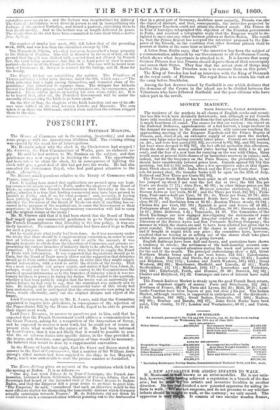The Zeitung gives an account of the negotiations which led
to the meeing at Baden. It is as follows
" One day last week Prince de la Tour d'Auvergne, the French Am- bassador, informed Baron Schleinitz, Minister of Foreign Affairs, that his Sovereign had heard of the intended visit of the Prince Regent to Baden- Baden, and that the Emperor felt a great desire to go there to greet him. ' The Emperor,' he said, considered that such an interview would be the most efficient-matter for dissipating the lamentable distrust which Germany actually entertains towards France.' M. de Schleinitz did not think he could receive such a communication without pointing out to the Ambassador
that in a great part of Germany, doubtless most unjustly, Prussia was also the object of distrust, and that, consequently, the interview projected by the Emperor Napoleon could not attain the desired result. The Prince de hi Tour d'Auvergne telegraphed this objection of the Prussian government to Paris, and received a telegraphic reply that'the Emperor would be de- lighted to meet also any other German princes at Baden-Baden. The result is, that the Prince Regent has accepted the interview proposed by the Em- peror of the French, on the condition that other German princes shall be present at Baden at the same time as himself."
A letter from Berlin says, that "the interview has been the subject of a communication addressed 'by our Government to all the German Courts, which shows what importance is attached to it. It is known that many German Princes fear lest Prussia should deprive them of their sovereignty and annex their States. They fear that the actual state of things may further the plan. The Prussian note is to reassure them on this point.'
The King of Sweden has had an interview with the King of Denmark at the royal castle of Elsinore. The royal Dane is to return his visit at the camp before Stockholm.
Among the last decrees issued by Garibaldi is one which declares that the domains of the Crown in the island are to be divided between the Volunteers who have followed Garibaldi and the poor citizens who have taken part in the revolt.


























 Previous page
Previous page